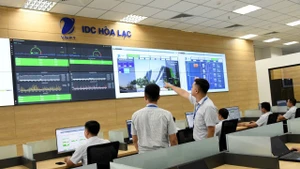It is also a strong export sector, aligned with Vietnam’s strengths and development priorities. However, the legal regulations governing this field were established nearly 20 years ago when information technology was still in its infancy and are now inadequate to address many current practical issues.
The Law on Digital Technology Industry needs to be researched and developed to timely supplement and institutionalise the policies and directions of the Party and State. This will create a strong enough incentive to promote digital technology into a foundational industry, contributing to the nation’s industrialisation and modernisation.
Legal gaps
Digital technology represents the next phase of information technology, with the emergence of new technologies such as 5G, IoT, AI, Big Data, Cloud, and Blockchain. These are breakthrough technologies, the main drivers of digital transformation and the digital economy. They emerged when Vietnam achieved certain development milestones, making it well-positioned to participate and capitalise on these technologies to leap forward.
Over the past years, digital technology has revolutionised nearly every aspect of life, changing how we communicate, work, learn, entertain, and access information.
While digital technology promotes economic growth, innovation, and globalisation, it also brings new challenges, such as the digital divide, privacy concerns, and cybersecurity threats.
However, the Information Technology Law 2006 does not include a legal framework defining digital technology or its industry. Additionally, with a population of nearly 100 million, Vietnam is a large market that can nurture and grow domestic digital technology companies. Current laws do not provide breakthrough measures to develop the domestic market for digital technology companies, especially small and medium-sized enterprises.
A notable sector with significant growth potential in Vietnam, such as semiconductor manufacturing, also currently lacks an appropriate mechanism for acceleration. Semiconductors, a core product of the digital technology industry, are at the heart of future technologies such as AI, 5G/6G, and IoT and are used in many digital products like smartphones and cars.
The demand for semiconductors is expected to double in the next decade. Major countries have implemented policies for this industry tailored to their global semiconductor value chain positions. Vietnam must also establish specific regulations to promote this critical sector.
The Ministry of Information and Communications has emphasised the urgency of building the Law on Digital Technology Industry to position Vietnam as a thriving digital technology industrial nation.
Institutionalising the views, goals, and development directions of the digital technology industry will help overcome limitations and establish a solid legal framework for implementing breakthrough mechanisms. It will also help mobilise all resources to effectively develop the potential of the digital technology industry, contributing to accelerating national digital transformation and advancing the digital economy and society.
Making digital technology a leading industry
On June 8, the National Assembly passed a resolution to include the draft Law on Digital Technology Industry in the law and ordinance-making programme for 2025. The law is expected to be discussed at the National Assembly’s 8th session (October 2024) and passed at the 9th session (May 2025). A draft of the law has already been released by the Ministry of Information and Communications to gather feedback from agencies, organisations, and businesses.
Nguyen Minh Hang, a representative of the drafting committee, stated that the Digital Technology Industry Law is being developed to affirm the legal value of the digital technology industry while proposing breakthrough policies to drive development and mitigate risks that may arise in the industry’s operations.
This legal framework will also promote the smart industrialisation of various sectors by incorporating digital technology, bringing new value and creating a revolution in smartening.
Furthermore, the Digital Technology Industry Law will focus on transitioning Vietnamese digital technology companies from primarily assembly and outsourcing to innovation, design, integration, production, and mastery of core technologies. It aims to create a domestic market and foster the development of digital technology products designed and manufactured within Vietnam.
In addition, as the semiconductor industry becomes a key sector that influences economic development and ensures national security for all countries, the draft law is expected to outline several special policies for developing the semiconductor industry. This aims to promptly respond to practical requirements and seize the wave of investment shifts, as many major global corporations are interested in investing in this field in Vietnam.
These policies include special investment incentives for new or expanded projects and mechanisms for co-investment and investment support to attract large-scale projects that have a ripple effect in the semiconductor industry. There are also specific recruitment mechanisms for experts and talent in the semiconductor field, strategic assignment of semiconductor development tasks to leading domestic digital technology companies, mechanisms to support technology transfer and mergers and acquisitions of technology companies both domestically and internationally.
In providing feedback on the draft, many experts suggest that the new law should focus significantly on two major policy areas: investment incentives and pilot licensing mechanisms. The Ministry of Information and Communications needs to offer the highest level of incentives, as these are priority sectors for development at this stage.
Nguyen Quang Dong from the Institute for Policy Studies and Media Development, part of the Vietnam Digital Communications Association (VDCA), proposed that the government should promote the application of a pilot management mechanism and a self-management mechanism based on widely recognised community/industry standards for new business models and the application of new technologies in Vietnam. In the short term, a useful and feasible pilot mechanism would enable data sharing between the public and private sectors, allowing businesses to effectively leverage and maximise the economic value of data.
















